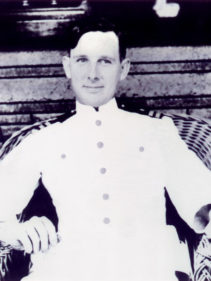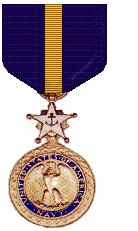Posthumous
Editor’s Note: I had a chance to attend a ceremony at the Office of Naval Intelligence yesterday in which the Director of Naval History and Heritage formally signed off with the ONI Commander and the Chairman of the Naval Intelligence Professionals to collaborate on a project to document the 150 years of Naval Intelligence contributions to the Nation. That will happen in 2032. It is going to be an exciting project that I look forward to helping with. It is history, after all, that gives us continuity going forward to whatever bold new world we are going to inhabit. The background noise of politics only reinforces just how crucial that is. There are people who are apparently comfortable with revising it to accommodate whatever the fashion of the moment might be.
I’m not, and neither was Mac. Here is some revisionism, done Old School.
– Vic
Posthumous

(Then-LT Joe Rochefort. A Great American, like Mac).
I have to tell you, Mac’s bottle of chardonnay was not a modest vintage. It had woody notes, and was inviting in aroma and crisp in presentation. So was President Reagan when he gave the Distinguished Service Medal to Joe Rochefort.
The years fell away as I looked over at the binder on the coffee table in front of Mac. The first picture had the iconic movie-actor whose greatest role was that of President. He looked fabulous, just as I remembered him from before the time his mind was stolen like Raven’s, and the once-bold gaze became glassy and the jowls drooped regardless of what Nancy tried to do.
“When was this, Admiral?” I asked.
Mac looked down at the binder. “May 30th, 1986,” he said. “I had been working on it for three years, the first while I was still working for the DCI. Jasper Holmes tried, in the mid-1950s, when he was back to teaching at the University of Hawaii. He got shot down, along with Fleet Admiral Nimitz. The Redman brothers and that pompous Wenger character were still around. They awarded themselves the DSM and could not bring themselves to admit that they assassinated the character of a better officer than them.”
“Joe Rochefort’s leadership at Station Hypo was one of the key aspects of the victory at Midway. And the way he was treated was shameful and embarrassing,” I said.
“True. But when President Reagan gave the DSM to Joe’s family, there was justice. Of course, only a handful of people who were there knew it, but of course nothing is easy. It gets stranger. Joe’s son and daughter were not talking. They had to have two medals and two citations.”
“Families are funny,” I said, thinking of my own. I looked curiously at the picture of the two Rochefort kids with the President of the United States, no animosity apparent.
“The son was an Army Colonel,” said Mac. “Joe Junior. I guess he didn’t want to get into a whole career fighting his Dad’s battles. Joe Senior died in 1976, but he remembered the insult of the service selection to his last days. His daughter- Janet Elerding- she was there, too with her whole family.”
“I knew you took on the fight to get the medal awarded even though the statute of limitations for the award had passed.”
Mac nodded as he flipped through the Kodachrome 8-by-10s. “I got through to Jasper Holmes, who was still alive then. He was in a nursing home in Honolulu, and it took a while to get him to understand what we had pulled off. But when he realized what I was talking about, he said it was Justice, finally. There was quite a tale about how it all came to pass.”

(Distinguished Service Medal. It is second on the precedence list of Navy awards, following only the Navy Cross.)
“So the medal was denied twice? I didn’t realize that.”
“Yep. Fleet Admiral Nimitz recommended it to Ernie King, but on the advice of the Redman brother’s, his chief of staff denied it. Then it was turned down again after the war when Jasper tried to push it through. Bu the time I started the effort to get it awarded, the three son-of-a-guns who torpedoed his cryptologic career were all in their graves.”
“SECNAV was John Lehman then?” I tried to remember. Mac nodded affirmatively.
“Yes. The package got lost on the OpNav staff, and it took a while to get it in front of him. But he was a believer.”
“Confusion in OpNav?” I snorted. “Go figure. But the second Reagan administration was a good one for the Navy. Remember the ‘five hundred ship Navy’ and Strategic Home Porting?”
“Yes I do,” said Mac. “I don’t think it was just Star Wars that sunk the Soviet Union. The whole thing is very much a Cold War story, but the Iranians are in there, too.”
“What do you mean, Admiral?”
“Well, I was working for Bill Casey before I retired from the Community Management Staff in 1981. I mentioned to him that we should try for an IC award since the DSM had been turned down twice. Casey told me that it was a Navy victory and it ought to be a Navy medal, and we decided to go for it. The Iran Contra Affair had given the IC another black eye…”
“Like when don’t we have a black eye? If we have a success we can’t talk about it, and if we have a failure of any kind- operational or intelligence- it is always an Intel fuck-up, not the policy-makers fault.”
Mac laughed. “That has always been true, and even triumph in combat only got Joe Rochefort transfer to command a floating dry-dock after making the primary contribution to the biggest naval battle since Trafalgar.”
“So this was all sort of a perfect storm that got Joe his medal?”
“It was. The package we put together never got to Navy Secretary John Lehman. It had not been rejected as we thought. He didn’t even know about it until Eddie Layton’s book came out and there was a lot of publicity about the communications intelligence that won the war we could finally talk about.
“George H.W. Bush had been DCI, and he was sensitive to the morale in the Intel Community. The President was committed to supporting the Contras in Nicaragua, and this looked like a good opportunity to highlight a great success rather than the advancement of Marxist insurgents.”
“Plus the Redman brothers were dead,” I said.
“Yes, they were. But of course almost all the players in the actual event, 44 years before, were gone. Tommy Dyer. Jasper Holmes. Eddie Layton. Joe himself, of course.”
“Sometimes it is best to be the last man standing,” I said. “That would be you, Sir. Who else was at the ceremony besides you and the family?”
Mac smiled. “Not a bad turn-out,” he said, flipping to a typescript page with official stamps affixed top and bottom. “Let’s see: The President spoke briefly and handed out the medals. The citation said that Rochefort’s information ‘served as the singular basis for Admiral Nimitz to plan his defenses, deploy his limited forces, and devise strategy to ensure U.S. Navy success in engaging the Japanese forces at Midway.’ ”
“Awesome,” I said, taking a sip of the chardonnay and feeling the oaky richness slip over my palate and the temporal fabric of the present give way to something else, Mac’s spirit so immediate and powerful.
“Vice President George H.W. Bush was there, SECDEF Weinberger, DCI Casey and the Chairman of the Joint Chiefs, Bill Crowe. Bill Studeman was there, too, though I can’t recall if he was Director of Naval Intelligence or NSA at that point.”
“Plus, I need you to know this,” he said calmly. He pointed to the typed memo with the stamps on it. “This is one of two things I value the most, though my family probably won’t care. It came from a friend of mine in St. Louis, right out of Joe Rochefort’s personnel file. It is the justification for the DSM. He flipped the glassine envelope over, revealing another handwritten letter. ”This is the one that I prize the most. It is the one that Admiral Nimitz wrote in 1958 when Jasper tried again to get the medal for Joe.
“Whoa,” I said. “That is a historic piece of paper. Good thing it didn’t go up in that big fire at the warehouse in St. Louis with all those WWII personnel records. How did you get it?”
Mac smiled and looked off in the distance. “My pal in St. Louis said I could keep these until I was done with them.” He closed the binder. “I am not done with them.”
I toasted him with my glass of chardonnay. “I suppose you should get around to deciding where these papers should go, Sir, But not yet. Not yet.”
Mac gave me one of those Sphinx-like smiles. “No,” he said. “Not just yet.”
You can imagine where that binder is today, and those two pieces of paper that Mac was very proud to have. I don’t think they are going back to St. Louis any time soon.
Copyright 2016 Vic Socotra
www.vicsocotra.com
